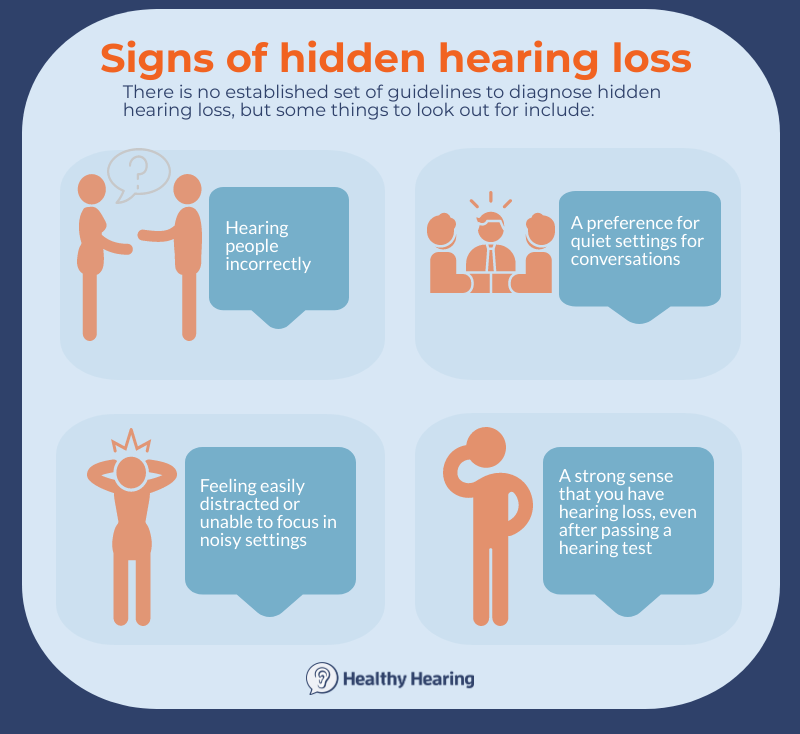|
www.HealthyHearing.com |
What is hidden hearing loss?When you can't hear well, despite normal hearing test results
Contributed by Joy Victory, managing editor, Healthy Hearing Key points:
Have you been told you have normal hearing test results, but still feel like you have problems hearing, especially speech and conversations? You may have what's known as "hidden" hearing loss. This means your ears are capable of detecting sound, but for some reason, the sound is not being transmitted correctly through the nervous system. In essence, you don't have hearing loss, but listening ability loss. An emerging conceptThe notion that people can have normal hearing thresholds but not normal listening ability is relatively new to researchers and clinicians. Because of this, some people in this situation are told they have normal hearing and nothing can be done, experts note. "People who present with normal (or nearly normal) audiograms are often dismissed with not much more than a brief discussion," wrote audiologist Douglas L. Beck in an opinion piece published by the American Academy of Audiology. This, he notes, fails "to address or incorporate a 21st century understanding of how humans hear and listen."
Signs of hidden hearing lossThere is no established set of guidelines to diagnose hidden hearing loss, but some things to look out for include:
A different kind of hearing lossHealthy hearing abilityIf our hearing ability is fully functional, sound waves create movement in the hair cells within our inner ears. The hair cells convert the sound wave to electrical energy and send signals to the auditory nerve. These signals must cross over synapses, which are the vital junctions between nerve cells. More: How we hear Typical hearing lossThe most common type of hearing loss arises from damage to the hair cells or the auditory nerve, an issue that's easily detectable on traditional hearing tests performed in a quiet booth. This is known as sensorineural hearing loss. Hidden hearing lossHidden hearing loss means any kind of hearing loss that causes problems with listening and understanding despite normal results on traditional hearing tests. The synapse theoryResearchers think some cases of hidden hearing loss are due to missing or faulty firing of auditory synapses. This means sound arrives to the brain incomplete, therefore missing information we need to interpret words. Medically this is sometimes referred to as "cochlear synaptopathy." The synapse theory is an area of emerging research largely based on animal models. More research is needed. However, other conditions can affect listening ability, including:
Some people may have multiple causes. They also may have other conditions that affect listening ability, including (but not limited to) attention deficit disorder, head trauma, and autoimmune diseases like multiple sclerosis, which destroy nerve tissue. Testing for hidden hearing lossIf you've been told that a standard "pure-tone" hearing test showed no signs of hearing loss, don't give up. What you likely need is more thorough testing. It may take getting a second opinion or calling around to find a knowledgeable provider. According to an article on hidden hearing loss in Hearing Journal, all of the following tests may be added to the traditional hearing test battery used by an audiologist or ear-nose-throat physician to help pinpoint what's behind the hidden hearing loss and rule out other causes:
Treatment for hidden hearing lossTreatment varies depending on the person's unique issues. Not every solution will help, but the options include:
Finding the right provider is keyWith limited diagnostic tools—especially for suspected synapse problems—finding the root cause can be challenging, noted audiologist Kathleen Kelliher Ward in the Hearing Journal article. Still, that doesn't mean the patient can't be helped. “It is important to affirm for patients that the difficulty is real and to provide intervention accommodations, strategies, and—when needed—technology to manage the difficulties they are experiencing,” said Ward, an audiology service coordinator at Loyola Clinical Centers, part of Loyola University Maryland in Baltimore. Find an audiologist near you by visiting our directory of hearing care providers. Please note that not all hearing clinics treat hidden hearing loss, so you may need to browse several clinic pages to find the right provider. Joy Victory, managing editor, Healthy Hearing
|
Featured clinics near me
Earzlink Hearing Care - Reynoldsburg
7668 Slate Ridge Blvd
Reynoldsburg, OH 43068

Find a clinic
Need a hearing test but not sure which clinic to choose?
Call 1-877-872-7165 for help setting up a hearing test appointment.



 Joy Victory has extensive experience editing consumer health information. Her training in particular has focused on how to best communicate evidence-based medical guidelines and clinical trial results to the public. She strives to make health content accurate, accessible and engaging to the public.
Joy Victory has extensive experience editing consumer health information. Her training in particular has focused on how to best communicate evidence-based medical guidelines and clinical trial results to the public. She strives to make health content accurate, accessible and engaging to the public.